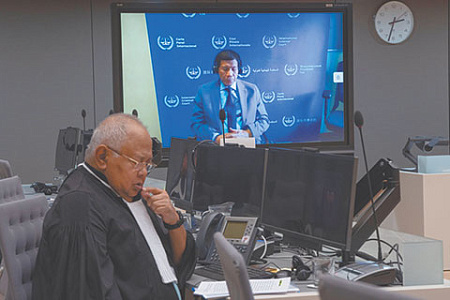
The landmark trial of former Philippine President Rodrigo Duterte at the International Criminal Court (ICC) for crimes against humanity is on the verge of collapse, creating a major challenge for the pursuit of international justice. Proceedings in The Hague have stalled as the 80-year-old ex-leader is reportedly too ill to attend hearings, threatening to derail one of the few cases where a former head of state has been physically brought before the court to face charges.
Duterte, who led the Philippines from 2016 to 2022, was arrested and transferred to the ICC’s detention facility in March 2025. The charges against him stem from his notorious and bloody “war on drugs,” a violent campaign that began during his tenure as mayor of Davao City and dramatically intensified during his presidency. The campaign resulted in the extrajudicial killings of thousands of people, often under the pretext that they were drug dealers or users.
This brutal crackdown drew widespread international condemnation from figures such as then-US President Barack Obama and UN Secretary-General Ban Ki-moon. Duterte and his administration consistently deflected criticism by arguing that their harsh methods were a necessary evil to combat the Philippines’ severe drug problem, which had positioned the country as a key Southeast Asian market for methamphetamine and a transit point for Latin American cocaine.
In a move widely seen as an attempt to evade prosecution, Duterte ordered the Philippines’ withdrawal from the Rome Statute, the ICC’s founding treaty, in 2018. However, the court ruled that it retains jurisdiction over crimes committed while the country was a member state from 2011 to 2018. The formal charges focus on a fraction of the total deaths, alleging Duterte’s direct involvement in dozens of specific murders where prosecutors claim to have direct evidence, while human rights organizations estimate the actual death toll could be in the tens of thousands.
The entire legal process now faces a critical impasse. Duterte’s defense lawyer, Nicolas Kaufman, has stated that his client cannot stand trial due to “cognitive impairments,” a claim underscored by Duterte’s frail appearance via video link during an initial hearing. According to ICC statutes, a trial cannot proceed in the accused’s absence unless they voluntarily waive their right to be present—a move the defense is highly unlikely to make, potentially bringing the case to a permanent standstill.
Beyond the courtroom drama, a fierce political battle is raging in the Philippines. The former president’s daughter, current Vice President Sara Duterte, is spearheading a campaign for his release. She frames the trial as a politically motivated witch hunt orchestrated by her political rival, President Ferdinand Marcos Jr., son of the late dictator Ferdinand Marcos Sr. The Duterte camp alleges that the Marcos administration is colluding with the ICC to neutralize a powerful political opponent.
This narrative transforms the legal proceedings into a high-stakes clash between the Philippines’ most powerful political dynasties—the Dutertes and the Marcoses. For Sara Duterte, a conviction against her father would be a devastating blow to her own political ambitions and the immense influence of her family clan. Consequently, the fate of Rodrigo Duterte is now inextricably linked not only to the principles of international accountability but also to a raw power struggle shaping the future of Philippine politics.
